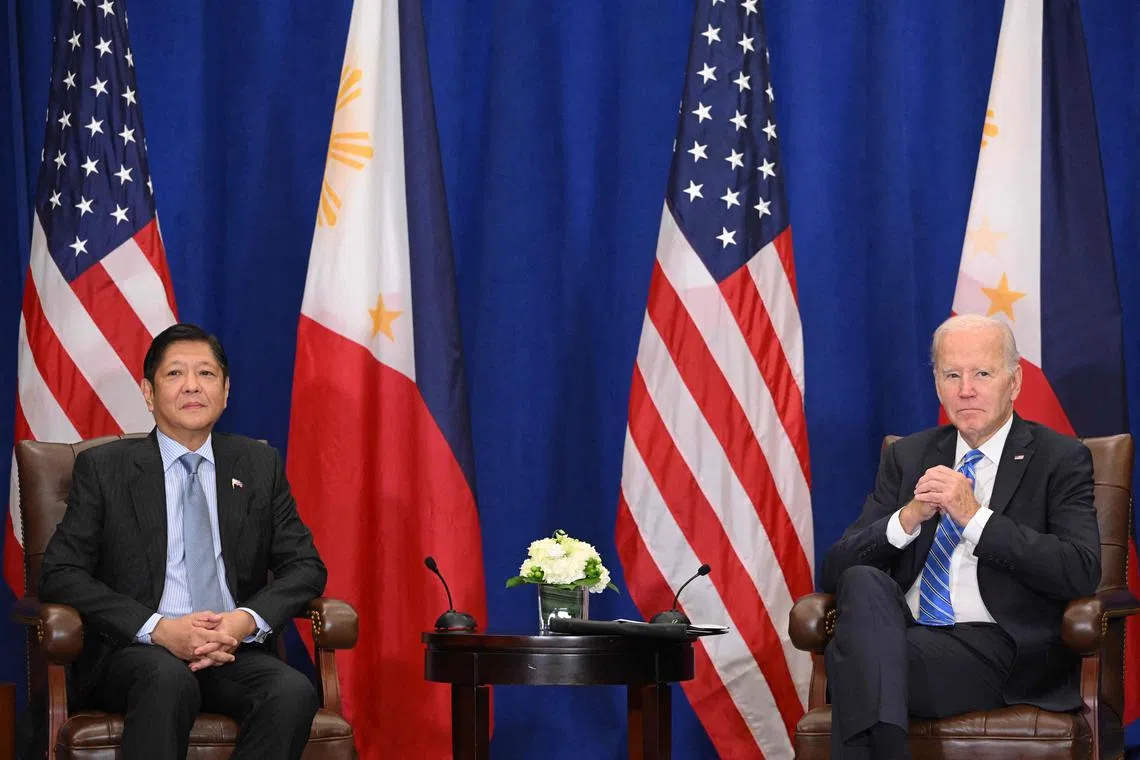Biden to meet Philippine President Marcos at White House as China tensions escalate
Sign up now: Get insights on Asia's fast-moving developments

US President Joe Biden first met Philippine President Ferdinand Marcos Jr in 2022 on the sidelines of the United Nations General Assembly in New York.
PHOTO: AFP
Follow topic:
MANILA – United States President Joe Biden will welcome Philippine President Ferdinand Marcos Jr to the White House on May 1, with their meeting set against the backdrop of heightened tensions with China.
White House press secretary Karine Jean-Pierre said the two leaders will discuss their countries’ efforts to uphold international law and promote a free and open Indo-Pacific, where Beijing is exerting its influence.
They will review opportunities to deepen economic ties and tackle issues such as clean energy transition, climate change and human rights.
“During the visit, President Biden will reaffirm the United States’ iron-clad commitment to the defence of the Philippines, and the leaders will discuss efforts to strengthen the longstanding US-Philippines alliance,” Ms Jean-Pierre added.
Analyst Dindo Manhit, the president of Manila-based think-tank Stratbase ADR Institute, said the bilateral meeting gives the Marcos government a chance to strategise and discuss new ways to further maximise its alliance with the US.
“By working closely with the United States and other like-minded allies and partners in the region, his administration continues to pursue an independent foreign policy that goes beyond the US-China rivalry and focuses on national interest and the welfare of the Filipino people,” Mr Manhit said.
The two leaders first met in September 2022
The White House announcement came amid China’s displeasure over the Marcos government giving the US access to four more military bases
Forged in 2014, the agreement allows the US to rotate troops, bring in equipment and hold joint exercises with their Philippine counterparts in nine mutually agreed upon military bases in the Philippines.
Philippine and US military forces are also currently holding their largest war games yet, aiming to highlight their maritime defence capabilities. The joint exercise will run until April 28.
The White House’s press release was made on the same day Chinese State Councillor and Foreign Minister Qin Gang arrives in Manila to meet Philippine Foreign Affairs Secretary Enrique Manalo.
Experts see the Edca expansion as a means for the US and the Philippines to deter China’s growing military aggression in the Taiwan Strait and the South China Sea.
Though the Philippines has no diplomatic relations with Taiwan, Manila would be caught in the crossfire should tensions escalate between Taipei and Beijing.
Manila has said it will not interfere in China’s domestic affairs, and that it will not be used by a third party to advance its cause.
Chinese Ambassador Huang Xilian drew criticism last week
Mr Marcos, however, downplayed Mr Huang’s controversial statement – made at a forum in Manila – as having been “lost in translation”.
There are about 158,000 Filipinos working in Taiwan.
The Philippines and the US are long-time allies, but relations turned cold under former president Rodrigo Duterte. He pivoted away from Washington in favour of getting loans and grants from China.
Relations between Manila and Washington are seeing a reboot under Mr Marcos, who is rekindling defence and security ties with the US as Chinese incursions continue in the eastern parts of the South China Sea that lie within the Philippines’ exclusive economic zone.
Despite the tensions, he is also fostering economic ties with China, which remains the largest trading partner of the Philippines.
Mr Marcos went to Beijing for a state visit in January,
The meeting between the Chinese and Philippine foreign ministers this weekend will follow up on the agreements made during Mr Marcos’ state visit, as well as bilateral talks that were held in Manila in March.


